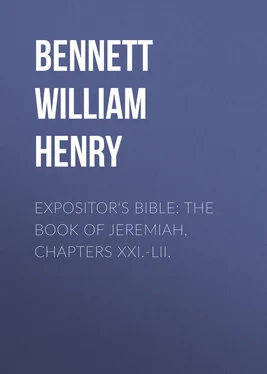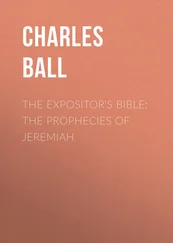William Bennett - Expositor's Bible - The Book of Jeremiah, Chapters XXI.-LII.
Здесь есть возможность читать онлайн «William Bennett - Expositor's Bible - The Book of Jeremiah, Chapters XXI.-LII.» — ознакомительный отрывок электронной книги совершенно бесплатно, а после прочтения отрывка купить полную версию. В некоторых случаях можно слушать аудио, скачать через торрент в формате fb2 и присутствует краткое содержание. Издательство: Иностранный паблик, Жанр: foreign_religion, foreign_antique, foreign_prose, на английском языке. Описание произведения, (предисловие) а так же отзывы посетителей доступны на портале библиотеки ЛибКат.
- Название:Expositor's Bible: The Book of Jeremiah, Chapters XXI.-LII.
- Автор:
- Издательство:Иностранный паблик
- Жанр:
- Год:неизвестен
- ISBN:нет данных
- Рейтинг книги:5 / 5. Голосов: 1
-
Избранное:Добавить в избранное
- Отзывы:
-
Ваша оценка:
- 100
- 1
- 2
- 3
- 4
- 5
Expositor's Bible: The Book of Jeremiah, Chapters XXI.-LII.: краткое содержание, описание и аннотация
Предлагаем к чтению аннотацию, описание, краткое содержание или предисловие (зависит от того, что написал сам автор книги «Expositor's Bible: The Book of Jeremiah, Chapters XXI.-LII.»). Если вы не нашли необходимую информацию о книге — напишите в комментариях, мы постараемся отыскать её.
Expositor's Bible: The Book of Jeremiah, Chapters XXI.-LII. — читать онлайн ознакомительный отрывок
Ниже представлен текст книги, разбитый по страницам. Система сохранения места последней прочитанной страницы, позволяет с удобством читать онлайн бесплатно книгу «Expositor's Bible: The Book of Jeremiah, Chapters XXI.-LII.», без необходимости каждый раз заново искать на чём Вы остановились. Поставьте закладку, и сможете в любой момент перейти на страницу, на которой закончили чтение.
Интервал:
Закладка:
Accordingly it was Baruch who went up to the Temple. Though he is said to have read the book "in the ears of all the people," he does not seem to have challenged universal attention as openly as Jeremiah had done; he did not stand forth in the court of the Temple, 34 34 xxvi. 2.
but betook himself to the "chamber" of the scribe, 35 35 So Cheyne; the Hebrew does not make it clear whether the title "scribe" refers to the father or the son. Giesebrecht understands it of Shaphan, who appears as scribe in 2 Kings xxii. 8. He points out that in verse 20 Elishama is called the scribe, but we cannot assume that the title was limited to a single officer of state.
or secretary of state, Gemariah ben Shaphan, the brother of Jeremiah's protector Ahikam. This chamber would be one of the cells built round the upper court, from which the "new gate" 36 36 Cf. xxvi. 10.
led into an inner court of the Temple. Thus Baruch placed himself formally under the protection of the owner of the apartment, and any violence offered to him would have been resented and avenged by this powerful noble with his kinsmen and allies. Jeremiah's disciple and representative took his seat at the door of the chamber, and, in full view of the crowds who passed and repassed through the new gate, opened his roll and began to read aloud from its contents. His reading was yet another repetition of the exhortations, warnings, and threats which Jeremiah had rehearsed on the feast day when he spake to the people "all that Jehovah had commanded him"; and still both Jehovah and His prophet promised deliverance as the reward of repentance. Evidently the head and front of the nation's offence had been no open desertion of Jehovah for idols, else His servants would not have selected for their audience His enthusiastic worshippers as they thronged to His Temple. The fast itself might have seemed a token of penitence, but it was not accepted by Jeremiah, or put forward by the people, as a reason why the prophecies of ruin should not be fulfilled. No one offers the very natural plea: "In this fast we are humbling ourselves under the mighty hand of God, we are confessing our sins, and consecrating ourselves afresh to service of Jehovah. What more does He expect of us? Why does He still withhold His mercy and forgiveness? Wherefore have we fasted, and Thou seest not? Wherefore have we afflicted our soul, and Thou takest no knowledge?" Such a plea would probably have received an answer similar to that given by one of Jeremiah's successors: "Behold, in the day of your fast ye find your own pleasure, and oppress all your labourers. Behold, ye fast for strife and contention, and to smite with the fist of wickedness: ye fast not this day so as to make your voice to be heard on high. Is such the fast that I have chosen? the day for a man to afflict his soul? Is it to bow down his head as a rush, and to spread sackcloth and ashes under him? wilt thou call this a fast, and a day acceptable to Jehovah?"
"Is not this the fast that I have chosen? to loose the bonds of wickedness, to undo the bands of the yoke, and to let the oppressed go free, and that ye break every yoke? Is it not to deal thy bread to the hungry, and that thou bring the poor that are cast out to thy house? when thou seest the naked, that thou cover him; and that thou hide not thyself from thine own flesh? Then shall thy light break forth as the morning, and thy healing shall spring forth speedily: and thy righteousness shall go before thee; the glory of Jehovah shall be thy rearward." 37 37 Isa. lviii. 3-8.
Jeremiah's opponents did not grudge Jehovah His burnt-offerings and calves of a year old; He was welcome to thousands of rams, and ten thousands of rivers of oil. They were even willing to give their firstborn for their transgression, the fruit of their body for the sin of their soul; but they were not prepared "to do justly, and to love mercy, and to walk humbly with their God." 38 38 Micah vi. 6-8.
We are not told how Jeremiah and the priests and prophets formulated the points at issue between them, which were so thoroughly and universally understood that the record takes them for granted. Possibly Jeremiah contended for the recognition of Deuteronomy, with its lofty ideals of pure religion and a humanitarian order of society. But, in any case, these incidents were an early phase of the age-long struggle of the prophets of God against the popular attempt to make ritual and sensuous emotion into excuses for ignoring morality, and to offer the cheap sacrifice of a few unforbidden pleasures, rather than surrender the greed of grain, the lust of power, and the sweetness of revenge.
When the multitudes caught the sound of Baruch's voice and saw him sitting in the doorway of Gemariah's chamber, they knew exactly what they would hear. To them he was almost as antagonistic as a Protestant evangelist would be to the worshippers at some great Romanist feast; or perhaps we might find a closer parallel in a Low Church bishop addressing a ritualistic audience. For the hearts of these hearers were not steeled by the consciousness of any formal schism. Baruch and the great prophet whom he represented did not stand outside the recognised limits of Divine inspiration. While the priests and prophets and their adherents repudiated his teaching as heretical, they were still haunted by the fear that, at any rate, his threats might have some Divine authority. Apart from all theology, the prophet of evil always finds an ally in the nervous fears and guilty conscience of his hearer.
The feelings of the people would be similar to those with which they had heard the same threats against Judah, the city and the Temple, from Jeremiah himself. But the excitement aroused by the defeat of Pharaoh and the hasty return of Nebuchadnezzar to Babylon had died away. The imminence of a new invasion made it evident that this had not been the Divine deliverance of Judah. The people were cowed by what must have seemed to many the approaching fulfilments of former threatenings; the ritual of a fast was in itself depressing; so that they had little spirit to resent the message of doom. Perhaps too there was less to resent: the prophecies were the same, but Baruch may have been less unpopular than Jeremiah, and his reading would be tame and ineffective compared to the fiery eloquence of his master. Moreover the powerful protection which shielded him was indicated not only by the place he occupied, but also by the presence of Gemariah's son, Micaiah.
The reading passed off without any hostile demonstration on the part of the people, and Micaiah went in search of his father to describe to him the scene he had just witnessed. He found him in the palace, in the chamber of the secretary of state, Elishama, attending a council of the princes. There were present, amongst others, Elnathan ben Achbor, who brought Uriah back from Egypt, Delaiah ben Shemaiah, and Zedekiah ben Hananiah. Micaiah told them what he had heard. They at once sent for Baruch and the roll. Their messenger, Jehudi ben Nethaniah, seems to have been a kind of court-usher. His name signifies "the Jew," and as his great-grandfather was Cushi, "the Ethiopian," it has been suggested that he came of a family of Ethiopian descent, which had only attained in his generation to Jewish citizenship. 39 39 So Orelli, in loco .
When Baruch arrived, the princes greeted him with the courtesy and even deference due to the favourite disciple of a distinguished prophet. They invited him to sit down and read them the roll. Baruch obeyed; the method of reading suited the enclosed room and the quiet, interested audience of responsible men, better than the swaying crowd gathered round the door of Gemariah's chamber. Baruch now had before him ministers of state who knew from their official information and experience how extremely probable it was that the words to which they were listening would find a speedy and complete fulfilment. Baruch must almost have seemed to them like a doomster who announces to a condemned criminal the ghastly details of his coming execution. They exchanged looks of dismay and horror, and when the reading was over, they said to one another, 40 40 Hebrew text "to Baruch," which LXX. omits.
"We must tell the king of all these words." First, however, they inquired concerning the exact circumstances under which the roll had been written, that they might know how far responsibility in this matter was to be divided between the prophet and his disciple, and also whether all the contents rested upon the full authority of Jeremiah. Baruch assured them that it was simply a case of dictation: Jeremiah had uttered every word with his own mouth, and he had faithfully written it down; everything was Jeremiah's own. 41 41 In verse 18 the word "with ink" is not in the LXX., and may be an accidental repetition of the similar word for "his mouth."
Интервал:
Закладка:
Похожие книги на «Expositor's Bible: The Book of Jeremiah, Chapters XXI.-LII.»
Представляем Вашему вниманию похожие книги на «Expositor's Bible: The Book of Jeremiah, Chapters XXI.-LII.» списком для выбора. Мы отобрали схожую по названию и смыслу литературу в надежде предоставить читателям больше вариантов отыскать новые, интересные, ещё непрочитанные произведения.
Обсуждение, отзывы о книге «Expositor's Bible: The Book of Jeremiah, Chapters XXI.-LII.» и просто собственные мнения читателей. Оставьте ваши комментарии, напишите, что Вы думаете о произведении, его смысле или главных героях. Укажите что конкретно понравилось, а что нет, и почему Вы так считаете.












